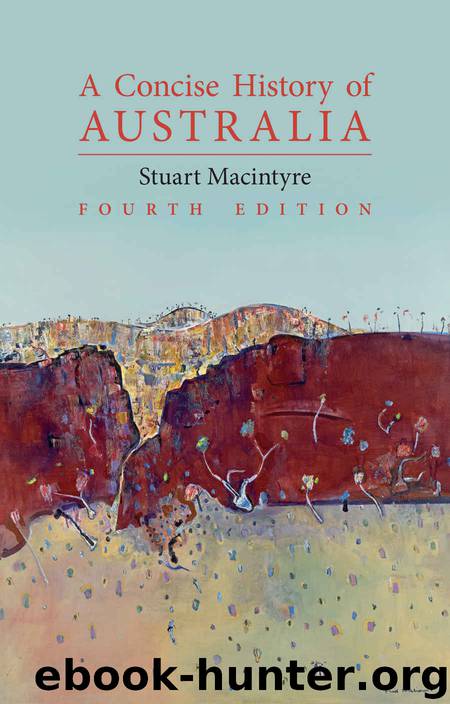Cambridge concise histories: A Concise History of Australia by Macintyre Stuart

Author:Macintyre, Stuart
Language: eng
Format: epub
Publisher: Cambridge University Press
Published: 2015-10-22T16:00:00+00:00
7.3 A large blackboard advertised the meeting of Aborigines in Sydney on the 150th anniversary of white settlement as a Day of Mourning.
(Man, March 1938)
The two groups came together, however, to lay down the policies that regulated how others lived. The inter-war years were the heyday of the expert as the determining intelligence of official policy, still unencumbered by considerations of consultation or consent. In urban planning, public administration, health, education, industry and finance, these experts prevailed, and at the end of the 1930s they were extending their reach to native policy. By this time the earlier forms of knowledge that defined Aboriginal Australians as a primitive race were losing their authority; the regime of protection was demonstrably failing.
The Aboriginal communities of southeast Australia had formed their own organisations, which reworked the terms protection and advancement to demand the abolition of the protection system and seek new ways of advancement. As Sydney staged a re-enactment of Governor Phillip’s landing on 26 January 1938 to commemorate the 150th anniversary of European occupation, the Aborigines’ Progressive Association observed a Day of Mourning for ‘the White-man’s seizure of our country’ and enslavement of their people. It called for a ‘new policy which will raise our people to full citizen status and equality’.
A week later these activists met with the prime minister and a new minister for the interior, who turned for advice from the administrators to the anthropologists. A national meeting of administrators in 1937 affirmed the policy of biological assimilation; the anthropologists offered an alternative expertise that replaced biology with culture. Culture was both universal and particular: it was an organising principle of all peoples but distinctive to each one of them. Accordingly, any attempt to assist Aborigines should be based not on the imposition of alien practices but rather on what A. P. Elkin, the professor of anthropology at the University of Sydney and chief adviser to the minister, described as ‘helping them to develop further along their own cultural lines’.
Elkin therefore called for an Aboriginal administration informed by anthropological expertise. He saw such a regime operating in Papua, where benevolent paternalism protected the Indigenous people from expatriate exploitation, in contrast to the mandate territory of New Guinea, where the plantation mastas enforced the obedience of indentured native labour. These two territories, however, were exotic places of exile and adventure for a thin sprinkling of white men and women; the indigenous Australians were an occupied minority, aliens in their own land.
Elkin’s recognition of cultural difference was qualified. While softening the rigid definitions of racial capacity that distinguished the savage from the civilised, he still discerned a hierarchy of racial development: the role of the anthropologist was to guide administrators with insights that would assist in ‘raising primitive races in the cultural scale’. While expounding the rich complexity of Aboriginal culture, he believed that it was fragile and unlikely to withstand exposure to European culture. He thought that those in the settled districts and towns had already lost much of their cultural identity.
Download
This site does not store any files on its server. We only index and link to content provided by other sites. Please contact the content providers to delete copyright contents if any and email us, we'll remove relevant links or contents immediately.
| Africa | Americas |
| Arctic & Antarctica | Asia |
| Australia & Oceania | Europe |
| Middle East | Russia |
| United States | World |
| Ancient Civilizations | Military |
| Historical Study & Educational Resources |
The Songlines by Bruce Chatwin(2549)
The Fatal Shore by Robert Hughes(1187)
Origins to Eureka by Thomas Keneally(876)
Australia 1901 - 2001 by Andrew Tink(833)
11 The Bear And The Dragon by Tom Clancy(806)
Eureka to the Diggers by Thomas Keneally(750)
A Commonwealth of Thieves: The Improbable Birth of Australia by Thomas Keneally(748)
A Commonwealth of Thieves by Thomas Keneally(720)
Dark Emu by Bruce Pascoe(713)
Shoot Straight, You Bastards! by Nick Bleszynski(692)
Venom by Brendan James Murray(679)
The Tall Man by Chloe Hooper(678)
James Cook by Peter Fitzsimons(674)
The Penguin History of New Zealand by Michael King(673)
The Golden Country by Tim Watts(652)
The Book Of Ian Watson by Ian Watson(646)
Carnivorous Nights: On the Trail of the Tasmanian Tiger by Margaret Mittelbach; Michael Crewdson; Alexis Rockman(637)
Murder on Easey Street by Helen Thomas(579)
Australian History for Dummies by Alex McDermott(512)
